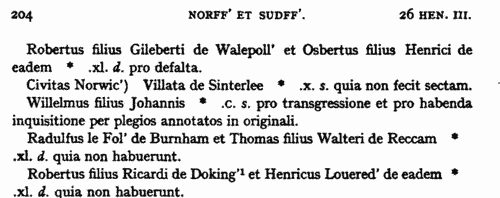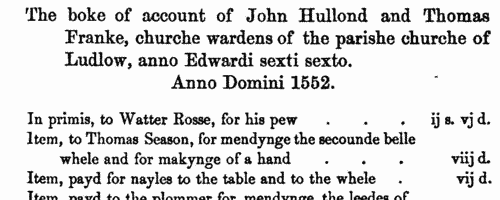Geres Surname Ancestry ResultsOur indexes 1000-1999 include entries for the spelling 'geres'. In the period you have requested, we have the following 7 records (displaying 1 to 7): Buy all | | | Get all 7 records to view, to save and print for £28.00 |
These sample scans are from the original record. You will get scans of the full pages or articles where the surname you searched for has been found. Your web browser may prevent the sample windows from opening; in this case please change your browser settings to allow pop-up windows from this site. Pipe Roll
(1241-1242)
The Great Rolls of the Pipe are the central record of the crown compiling returns of income and expenditure from the sheriffs and farmers of the various English counties or shires. This is the oldest series of public records, and the earliest surviving instances of many surnames are found in the Pipe Rolls. This is the roll for the 26th year of the reign of king Henry III, that is, accounting for the year from Michaelmas 1241 to Michaelmas 1242. Most (but not all) of the entries in which names appear relate to payments for grants of land and fines or pardons arising from the proceedings of the justices. The text was edited by Henry Lewin Cannon for Yale Historical Publications and printed in 1918. The name of the county is given at the head of each page, and variant spellings, omissions and additions found in the duplicate Chancellor's Roll [C. R.] are given in the footnotes.GERES. Cost: £4.00.  | Sample scan, click to enlarge

| Liberate Rolls
(1240-1245)
These chancery liberate rolls of the 25th to 29th years of the reign of Henry III of England record the details of payments and allowances as part of the administration of government. Most entries start with the Latin words 'liberate', meaning 'deliver', or 'allocate', meaning allow. There are also 'contrabreves', warrants mainly to sheriffs of shires, assigning them tasks and allowing expenses. Most of the entries relate to England and Wales, but there are occasional references to Ireland and the English possessions in France.GERES. Cost: £4.00.  | Sample scan, click to enlarge

| Fine Rolls
(1216-1246)
The fine rolls of the 1st to 30th years of the reign of king Henry III record part of the government administration in England. These excerpts from the rolls list in transcript applications by plaintiffs for various writs (such as 'ad terminum' and 'pone') and for assizes to be held by the justices in eyre to look into their grievances. A fine of half a mark (6s 8d) or a mark (13s 4d) was usually levied; the cases are normally identified by county, and record that the appropriate sheriff had been notified. There are also more extensive records, in which more detail is given. The excerpts were made by the Record Commission and printed in 1835.GERES. Cost: £4.00.  | Sample scan, click to enlarge

| Liberate Rolls
(1245-1251)
These chancery liberate rolls of the 30th to 35th years of the reign of Henry III of England record the details of payments and allowances as part of the administration of government. Most entries start with the Latin words 'liberate', meaning 'deliver', or 'allocate', meaning allow. There are also 'contrabreves', warrants mainly to sheriffs of shires, assigning them tasks and allowing expenses. Most of the entries relate to England and Wales, but there are occasional references to Ireland and the English possessions in France.GERES. Cost: £4.00.  | Sample scan, click to enlarge

| Fine Rolls
(1246-1272)
The fine rolls of the 31st to 57th years of the reign of king Henry III record part of the government administration in England. These excerpts from the rolls list in transcript applications by plaintiffs for various writs (such as 'ad terminum' and 'pone') and for assizes to be held by the justices in eyre to look into their grievances. A fine of half a mark (6s 8d) or a mark (13s 4d) was usually levied; the cases are normally identified by county, and record that the appropriate sheriff had been notified. There are also more extensive records, in which more detail is given. The excerpts were made by the Record Commission and printed in 1836.GERES. Cost: £4.00.  | Sample scan, click to enlarge

| Charter Rolls
(1050-1326)
This abstract of the surviving charter rolls for 1300 to 1326, in the reigns of kings Edward I and II, was prepared by C. G. Crump and A. E. Stamp and published in 1908. The charter rolls not only recorded royal grants of lands, liberties and offices, but also enabled landowners to have their existing charters, their deeds of title, registered by the process of inspeximus and confirmation. After the Statute of Mortmain of 1279, this was of particular importance to religious houses, now greatly restricted in their ability to receive new donations of land, and anxious to prove title to their ancient property. Consequently, many charters of great age were copied onto the charter rolls.GERES. Cost: £4.00.  | Sample scan, click to enlarge

| Inhabitants of Ludlow in Shropshire
(1540-1574)
The borough of Ludlow comprised a single ancient parish in the diocese of Hereford. The churchwardens' accounts from 1540 to 1574 were transcribed by Thomas Wright for the Camden Society and published in 1869. The two churchwardens were chosen annually: their accounts are largely concerned with the costs of repair of the church and its furnishings, and include the names of tradesmen and workmen. Wright looked through the remainder of the first surviving book of churchwardens' accounts, which extended to the end of the reign of queen Elizabeth, but found them largely repetitive, and chose to give just a few entries from them in an appendix, including the names of the churchwardens for each year. GERES. Cost: £4.00.  | Sample scan, click to enlarge

|
Research your ancestry, family history, genealogy and one-name study by direct access to original records and archives indexed by surname.
|









